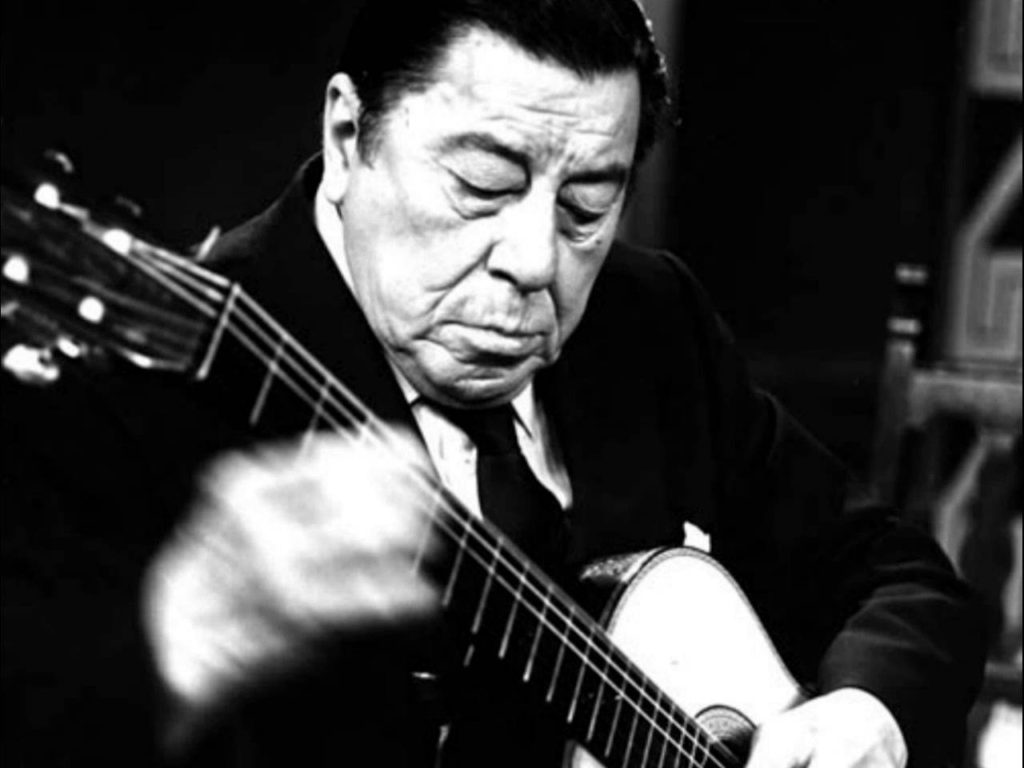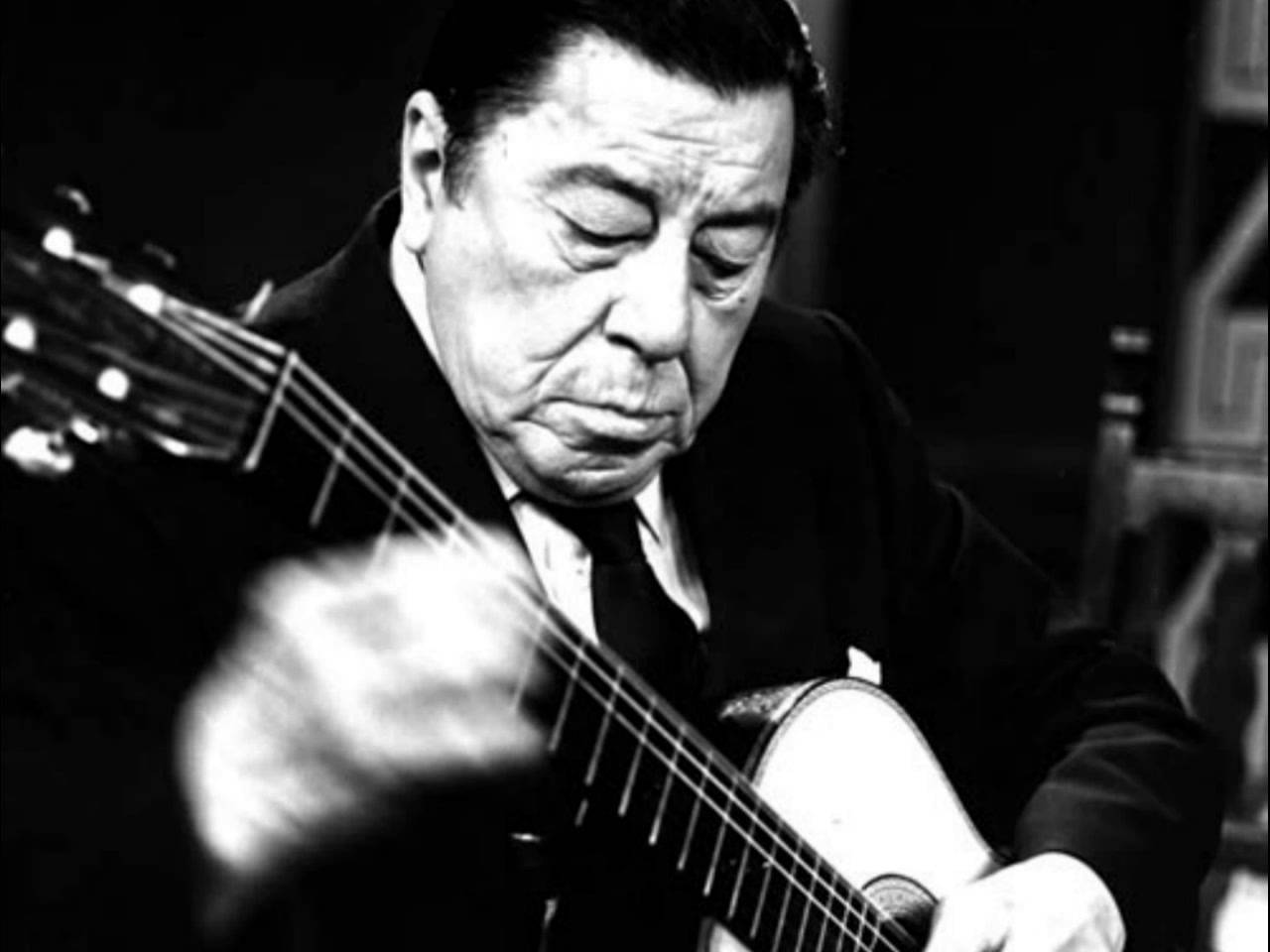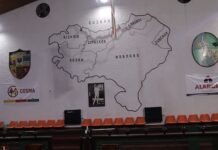Update on January 31, 2023. We’ve added the report and the audio published by Argentine National Radio in honor of the anniversary of the birth of Atahualpa Yupanqui.
It’s a true gem, this recording of his own testimony as preserved by the Historical Archives of Argentine National Radio. In it, among other things, he tells about his birth in Campo de la Cruz, in the Hegoburu fields, named for his great-aunt and -uncle.
(January 24, 2015)
We’re sure everything we’re writing here will be general knowledge for any Argentines who may be reading this, especially those of Basque descent. It’s possible that some Basques from the rest of the world might know this story, or rather collection of stories that we bring you here. But we’re sure that the vast majority of Basques and non-Basques who learn the story of this great Argentine singer-songwriter don’t know it, or at least all of it.
Atahualpa Yupanqui, the star of this story, was born Héctor Roberto Chavero Harán (and not Aramburu as sometimes stated). His stage name in English would mean “he who comes from afar to say something.” It already seems like a premonition of the “causes and chances” (using part of the poem by Silvio Rodríguez) that were inevitably going to unite him with the Basque People.

Firstly, it has to be said that everything we know we found out thanks to the extraordinary article Sergio Recarte brought us in Euskosare titled “Atahualpa Yupanqui: El criollo – vasco de la tierra argentina” (The Basque Creole from Argentina). Then, we have to explain why we decided to write this article about this great Argentine singer-songwriter. That would be thanks to the article María Rosario Echeverría published in the Argentine daily El Heraldo de Concordia with the title “‘Don Ata’ el Vasco,” based on Recarte‘s article. Echeverría’s article inspired us to write the entry, where we explore the strong, tight links that unite him with the Basques.
The first link is his origin. His mother was Higinia Carmen Haran and as the artist himself told, “she was born in Gipuzkoa, in the Basque Country.” That led him to define himself as “the son of a Creole and a Basque: I carry the silence of the mestizos and the tenacity of the Basques in my blood.”
This radical union with the Basques makes him feel tightly bound to his mother’s homeland, leading him to visit it on several occasions, and to come into contact with such essential people in contemporary Basque culture as Mikel Laboa, who recognized Yupanqui as one of his artistic influences.
As Jorge Recarte explains in his article, this relationship with everything Basque was not a sidenote for our protagonist:
Su origen vasco era frecuentemente resaltado e incluso recalcaba que su apellido paterno era oriundo de los territorios del País Vasco, “Chavero también es vasco, llegó a escribirse Xabero, con x hasta el año 1860, como Ximena, como Xavier. Provenían los Chaveros de Pamplona. Mi abuelo se llamaba Bernandino, era un vasco que habla quichua…” E incluso entraba en explicaciones sobre el significado de su apellido materno “…Aran en idioma vasco significa valle…”.
His Basque origin was frequently highlighted, and he even emphasized his paternal surname was originally from the Basque Country, “Chavero is also Basque; it was even written Xabero, with an X until 1860, like Ximena and Xavier. They came from the Chaveros of Pamplona. My grandfather was called Bernandino, he was a Basque who spoke Quechua…” and he even then started explaining the meaning of his maternal surname: “‘Aran’ in the Basque language means valley…”
The second link between him and the Basques is his political character. While this might be more chance than a cause, it is a deep and powerful chance named Hipólito Yrigoyen, the son of Basques from the the Northern Basque Country, who was twice the president of Argentina. He was fundamental in this history of this country, as can be seen with these two examples:
- He was the first president of Argentina to be elected by universal secret male vote.
- He was one of the founders of the Radical Civil Union (UCR), one of the oldest in South America, having been founded in 1891. This was the party Raúl Alfonsín, who became the first democratically-elected present of Argentina in 1983, after the fall of the 1975–1983 dictatorship, belonged to.
We wrote about him back in 2012, in an article titled Hipólito Yrigoyen, un Presidente vasco. And we refer to him again today because Atahualpa Yupanqui actively participated in the revolutionary movements that tried to return the presidency to Yrigoyen by bringing down the military man Agustín Pedro Justo. This was during the so-called “Decade of Infamy” and disappointment gripped the majority of the Argentine population. The attempted coup was a failure, and he was forced into exile, first to Uruguay and then to Brazil, both of which had gaucho lands where he felt at home.
The third link is also a “chance” one, but is again very deep, related to love and to one of the most grandiose gestures ever by the Basques. His lifelong companion, his wife Antonietta Paule Pepin Fitzpatrick, was born in Saint-Pierre-et-Miquelon. Yes, the same islets in the Gulf of St. Lawrence whose flag carries the Ikurriña. Basque culture is so strong there that, six years before Nannette was born, the Cercle dez Zazpiak-Bat, the oldest sporting club on the island, had been founded. As a Basque-descendant from Argentina, he was thus related to the land that for centuries had been the home of the Basque whalers who reached the coasts of modern-day Newfoundland in the 16th century (if not far earlier).
The fourth link is profoundly symbolic. He passed away on May 23, 1992, and his ashes were laid to rest at the foot of an oak tree located in his beloved Córdoba town of Cerro Colorado. As to the reason for this choice, his son explained, “The tree was planted by my mother. She chose the oak because for one of the oldest peoples of Europe it is a sacred tree, a symbol of freedom.”
As Silvio Rodríguez’ poem goes:
Y las causas lo fueron cercando
Cotidianas, invisibles.
Y el azar se le iba enredando
Poderoso, invencible.
And the causes were surrounding him,
everyday, invisible.
And chance was getting tangled up,
powerful, invincible.
Causes, chances, and a strong sense of belonging, led to this Argentine of Indian and Basque descent to feel a strong connection to the land of his forebears.
These are the links that we’ve highlighted. We’re sure our readers can find more in the extraordinary article by Sergio Recarte, which we’ll leave here. Alongside the article by María Rosario Echeverría, we’ll also leave you with one of Yupanqui’s songs: “Madre vasca“.
Radio Nacional de Argentina – 31/1/2023 – Argentina
Se cumple un nuevo aniversario del natalicio de Atahualpa Yupanqui
(Transcription at the end of the article)
Hijo de un padre con raíces quechuas y una madre del país vasco español, Atahualpa Yupanqui nació en Campo de la Cruz, provincia de Buenos Aires, el 31 de enero de 1908. Héctor Roberto Chavero fue el nombre con el que lo anotaron en el Registro Civil, pero Atahualpa Yupanqui fue el que adoptó en 1913.
(Follow) (Automatic translation)
El Heraldo de Concordia – 21/1/2015 – Argentina
«Don Ata». El vasco
No es otro que Atahualpa Yupanqui Jorge Recarte, argentino de ascendencia vasca y que se encarga de difundir la cultura vasca, escribió la siguiente nota referida a uno de los más grandes cultores del folclore argentino, nota que me permito dejar aquí. «Soy hijo de criollo y vasco. Llevo el silencio del mestizo y la tenacidad del vasco».
(Follow) (Automatic translation)
Atahualpa Yupanqui. Madre Vasca
ATAHUALPA YUPANQUI “EL CRIOLLO – VASCO DE LA TIERRA ARGENTINA”
Radio Nacional de Argentina audio file
Last Updated on Mar 23, 2023 by About Basque Country





